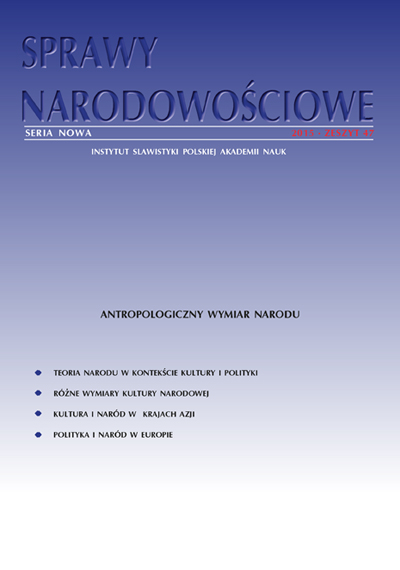Religia, ideologia i tradycjonalizm w Japonii od okresu Meiji. Wprowadzenie do problematyki
Religion, ideology and traditionalism in Japan from Meiji period. Introduction into the issue
Author(s): Klaus AntoniSubject(s): History, Social Sciences, Sociology, Theology and Religion
Published by: Instytut Slawistyki Polskiej Akademii Nauk
Keywords: nation; nationalism; Eric J. Hobsbawm; Japan; Meiji period; traditionalism
Summary/Abstract: In many ways reminiscent of the situation today, the end of the 19th century saw ethnically and religiously based political conflicts throughout the world. Within the context of global nation building the postulation of respective culturally indigenous traditions played a central role, a concept called “nativism” in cultural anthropology. In this process indigenous, usually strongly religiously influenced (national) traditions were contrasted with the modern global civilization spanning national borders. Thus, the realm of “tradition” was defined as ethnic and therefore “authentic”, while modernity was potentially seen as supranational–that is to say, foreign, therefore standing in opposition to the allegedly traditional and indigenous cultures of the respective regions or nations. But when going deeper into this conflict, the highly complicated and diverse structure of the problem becomes apparent. Hardly any other academic theory has had such a revolutionary influence in this respect as that of the so called “invented traditions”. Its most basic insight is that the generally used binary antagonism of “tradition” vs. “modernity”, which appears so concise and stringent, is by no means sufficient to describe the complexity of the historical process, but requires at least one additional, third category: that of intentionally adjusted, created, or “invented” traditions. The late scholar Eric J. Hobsbawm and his colleagues must be thanked for their pioneering studies in this area which have shed light on the worldwide genesis of such artificial and often intentionally created national traditions which only pretend to be old. But it was another author, Dietmar Rothermund, who already before Hobsbawm et al. undertook a critical methodological step forward toward further clarification. In his research on modern India and especially the ideology of Hindu nationalism, he invented the term of “traditionalism” in this respect. Meiji Japan played a prominent role within this global process of nation building and religious nativism. So it seems especially productive to discuss the theories and problems of “invented traditions” and “traditionalism” in the light of the Japanese case. Not only for the Japanologist as a regional specialist but also for the general historian it could be extremely fruitful to take the Japanese case into account when talking about the anthropology of nation, since it is generally high time to realize that the study of history cannot be reduced to a eurocentric or western view of the world.
Journal: Sprawy Narodowościowe
- Issue Year: 2015
- Issue No: 47
- Page Range: 126-133
- Page Count: 8
- Language: Polish

